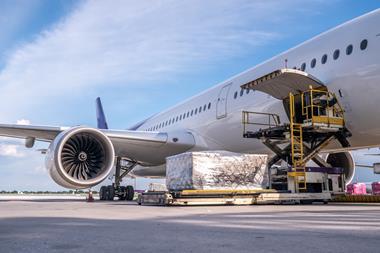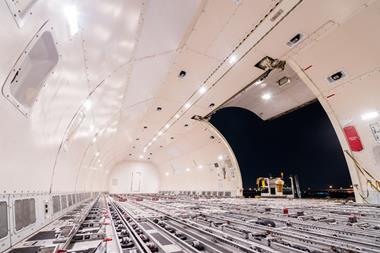Flexport has become the latest freight forwarder to charter aircraft capacity for the peak season in order to avoid capacity shortages.
The US forwarder revealed that it will charter a Boeing 747-400F aircraft from Atlas Air Worldwide for use on the transpacific tradelane. The first flight will from Hong Kong on November 19, heading to Los Angeles.
Flexport described the move as a "major launch" for the company, which only entered the airfreight market in 2014.
Looking ahead, chartered flights will become an ongoing Flexport service in 2018, which will open up a new revenue stream for the company.
The forwarder said it had decided to launch the service on the "exponential growth in e-commerce" and an increase in product launches, such as the iPhone X, which had coincided in flight cancellations to create a capacity shortage.
"Waiting until room frees up is not an option for most companies," the forwarder said.
Flexport is not the only forwarder that has secured extra capacity ahead of the peak season because of high levels of demand and concerns over capacity shortages.
Panalpina recently revealed that it had secured extra capacity under block space and ACMI deals, as well as increasing the number of flights in its own charter network.
Kuehne+Nagel said it had also secured ACMI capacity after seeing demand increase by more than 20% in the third quarter of the year, which equates to seven extra full Boeing 747Fs per day.
The forwarder said that while it regularly utilises ACMI capacity, it has increased the amount secured this year, particularly for China exports.
Earlier this year, Dachser sent out a customer note stating that it had secured extra charter capacity for the peak season, while in September DHL’s forwarding arm announced that it would begin operating an ACMI airfreight operation utilising B747F capacity.
The topic also came up at a recent panel discussion at the Freighters World conference, with all-cargo executives saying they had noticed an increase in the number of forwarders and e-commerce companies looking to secure freighter capacity rather than rely on belly space.
Nippon Cargo Airlines president, Americas, Shawn McWhorter said: “Amazon could have taken the approach to go to Delta, go to United, and say let me buy all your belly capacity – why didn't they do that?” McWhorter questioned.
“Because it doesn't give the service commitment that they need to their customer on a regular basis – they can't control the network.
“So instead they went to a more expensive solution, but one that is more customer focused, and put their own network up.
“Now we are seeing more and more demand as an all-cargo carrier, that forwarders come to us and say we want to buy a piece of your network, not just a couple of positions or half a plane, we want you to run a network for us.
“Atlas is flying a couple of round the world flights for DHL, was that because DHL couldn't find enough capacity on the bellies? No, it is because the capacity wasn't in the right markets at the right time at a control point that they can give the required service to the customer.”
The trend is being driven by a tighter balance between supply and demand meaning forwarders cannot as easily buy on the market and benefit from low prices, he said.
Read more freight forwarder news










